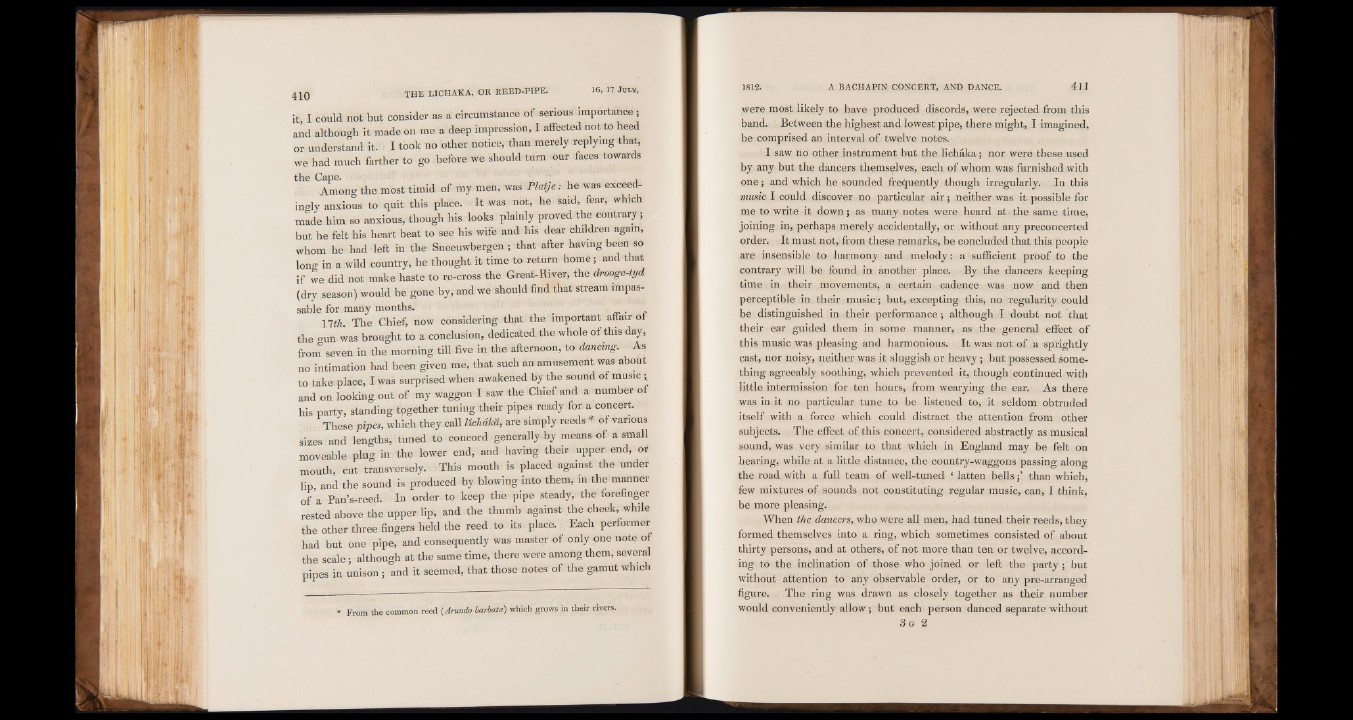
it, I could not but consider as a circumstance of serious importance ;
and although it made on me a deep impression, I affected not to heed
or understand it. I took no other notice, than merely replying that,
we had much farther to go before we should turn our faces towards
the GAampeo. n■g ; the most timid of my mJ en, ’ was P■ lat■j; e: he’ was exceed,ingly
anxious to quit this place. It was not, he said, fear, which
made him so anxious, though his looks plainly proved the contrary ;
but he felt his heart beat to see his wife and his dear children again,
whom he had left in the Sneeuwbergen ; that after having been so
long in a wild country, he thought it time to return home; and that
if we did not make haste to re-cross the Great-River, the drooge-tyd
(dry season) would be gone by, and we should find that stream impassable
for many months. „ . 11th. The Chief, now considering that the important affair ot
the gun was brought to a conclusion, dedicated the whole of this day,
from seven in the morning till five in the afternoon, to dancing. As
no intimation had been given me, that such an amusement was about
to take: place, I was surprised when awakened by the sound of music ^
and on looking, out; of my waggon I saw the Chief and a number of
his party, standing tpgether tuning their pipes ready for. a concert.
These pipes, which they call Uchdkd, are simply reeds * of various
siz.es and lengths, tuned to concord generally by means of a small
moveable plug in the lower end, and having their, upper end, or
mouth, cut transversely- This mouth is placed against the under
lip, and the sound is produced by blowing into them, in the manner
of'a Pan’s-reed. In order to keep the pipe steady, the forefinger
rested above the upper lip, and the thumb against the cheek, while
the other three fingers held the reed to its place. Each performer
had but one pipe, and consequently was master of only one note of
the scale; although at the same time, there were among them, several
pipes in unison; and it seemed, that those notes of the gamut which
* From the common reed (Arundo barbata) which grows in their rivers.
were most likely to have produced discords, were rejected from this
band. Between the highest and lowest pipe, there might, I imagined,
be comprised an interval of twelve notes.
I saw no other instrument but the lichaka; nor were these used
by any but the dancers themselves, each of whom was furnished with
one; and which he sounded frequently though irregularly. In this
music I could discover no particular air ; neither was it possible for
me to write it. down ; as many notes were heard at, the same time,
joining in, perhaps merely accidentally, or without any preconcerted
order. It must not, from these remarks, be concluded that this peopie
are insensible to harmony and melody: a sufficient proof to the
contrary will be found in another place. By the dancers keeping
time in their movements, a certain cadence was now and then
perceptible in their music; but, excepting this, no regularity could
be distinguished in their performance; although I doubt not that
their ear guided them in some manner, as the general effect of
this music was pleasing and harmonious. It was not of a sprightly
cast, nor noisy, neither was it sluggish or heavy; but possessed something
agreeably soothing, which prevented it, though continued with
little intermission for ten hours, from wearying the ear. As there
was in it no particular tune, to be listened to, it seldom obtruded
itself with a force which could distract the attention from other
subjects. The effect of this concert, considered abstractly as musical
sound, was very similar to that which in England may be felt on
hearing, while at a little distance, the country-waggons passing along
the road with a full team of well-tuned ‘ latten b e llsth a n which,
few mixtures of sounds not constituting regular music, can, I think,
be more pleasing.
When the dancers, who were all men, had tuned their reeds, they
formed themselves into a ring, which sometimes consisted of about
thirty persons, and at others, of not more than ten or twelve, according
to the inclination of those who joined or left the party; but
without attention to any observable order, or to any pre-arranged
figure. The ring was drawn as closely together as their number
would conveniently allow; but each person danced separate without
3 a 2